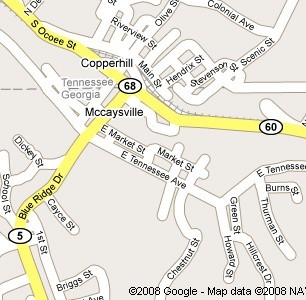But as Georgia eyes a longshot bid to move its state line north to the Tennessee River in pursuit of water for drought-stricken Atlanta, residents fear this Appalachian tourist town and its bars would be left high and dry - literally. If the move went through, local watering holes would be in Fannin County, Ga., which bans alcohol.
"Everybody would have to drive 40 miles" to get a beer, Deonna Beckett, 37, of Ducktown, said recently as she sat with friends at Dinos New York Pub in Copperhill.
Lawmakers in drought-stricken Georgia have empowered the governor to sue to correct an 1818 survey that mistakenly placed Georgia's northern line just short of the Tennessee River, which boasts a flow about 15 times greater than the one Atlanta depends on for water. Any border change would likely require an act of Congress or a U.S. Supreme Court ruling, so it's highly unlikely the state lines would actually move.
It's one of the more dramatic proposals to help Georgia cope with a drought of historic proportions. Most of the Atlanta metropolitan area of 5 million people is still in an extreme drought. And recent rains haven't done much to help its chief source of water, Lake Lanier, recharge its supply.
Though farfetched, the proposal to change the state border has generated plenty of debate in Copperhill and neighboring McCaysville, Ga., which have long made a name for themselves by poking fun at the jagged border that runs through their backyards.
The towns have painted bright blue dashes across streets, sidewalks, even the sides of downtown buildings to mark the border and amuse tourists. Numerous signs help visitors figure out where they are, declaring: "Welcome to Tennessee" or "Welcome to Georgia."
Once a copper mining boomtown, Copperhill now has about 500 residents, about half the size of McCaysville. Business owners in both towns count heavily on the painted border that attracts visitors and shoppers as a stop on the Blue Ridge Scenic Railroad.
Ray Leader, the rail company's general manager, said he would "hate to see any changes made" in the downtown boundary line.
"That's part of the allure of the Blue Ridge Scenic Railway," Leader said. "That's the charm of the little towns is the state lines goes through there."
The two towns have made accommodations over the years to adapt to their jagged boundary lines. Members of St. Catherine Laboure Catholic Church said some past wedding ceremonies have been carefully positioned to make sure vows were spoken inside the state where the priest was authorized to preside.
Despite the line separating them, the sister towns treat each other like kin and - unlike their states - have reached a water-sharing agreement from Blue Ridge Lake in Georgia. That makes residents all the more rankled about the plan to move the border.
Even 14-year-old Michelle Martinez, walking home from school in Copperhill, grimaced at the suggestion of suddenly living in another state.
"If I wanted to live in Georgia I'd move down there," she said.
Residents on the Georgia side also aren't sure they want to annex the town. Anna Sue Ray, 69, of Dallas, Ga., stood on an Old Bridge Street sidewalk marked with the blue stripes and told her two young granddaughters that their visit was not her first to Copperhill.
"Why change something that has been here so long?" she said.
Ray's advice to Atlanta: "Conserve more."

http://accesswdun.com/article/2008/6/210483
